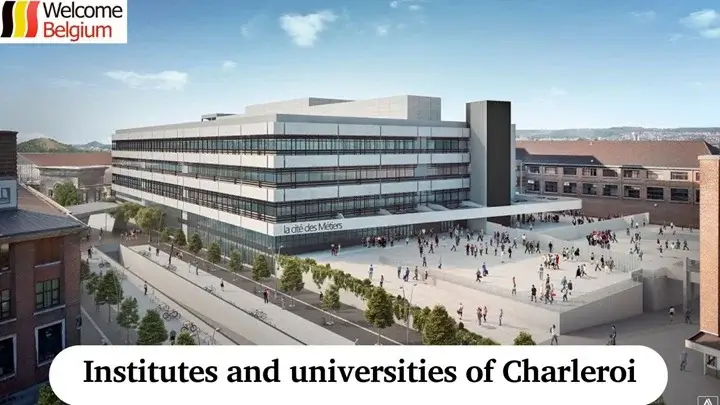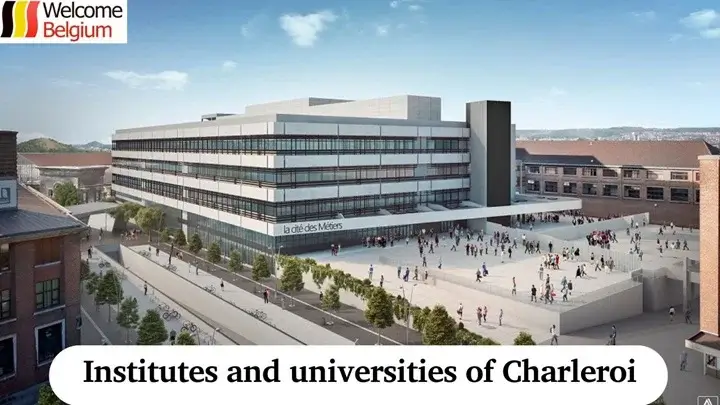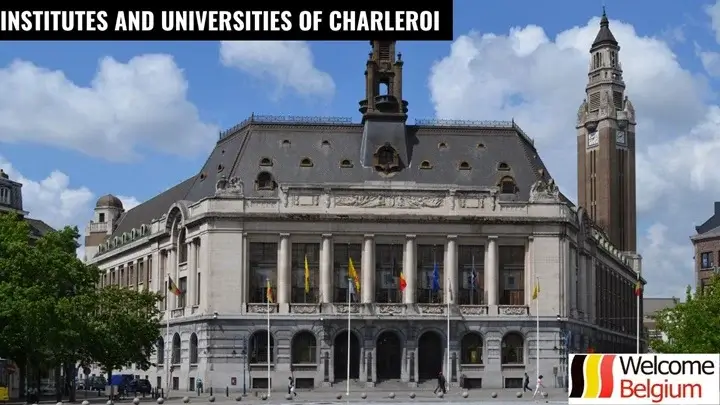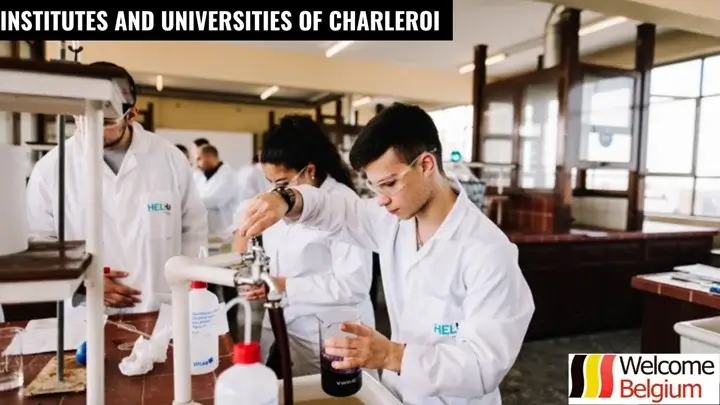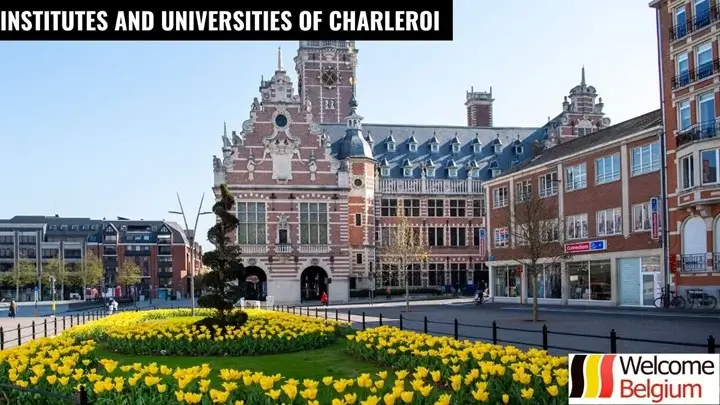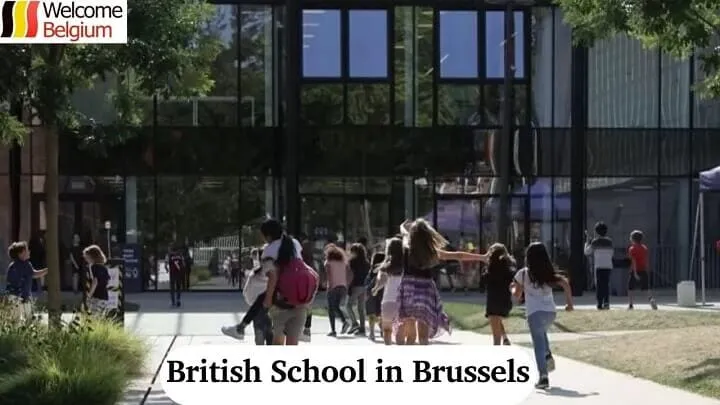Charleroi, an important economic and cultural centre of Wallonia, offers a wide range of higher education opportunities. It is home to several institutes and universities offering a wide range of courses, including technical and engineering sciences, arts and medicine. The city’s educational institutions attract students not only from Belgium but also from all over the world thanks to their high-quality programmes and modern learning environment.
Types of Institutes and Universities
Charleroi offers a variety of educational opportunities for students seeking higher education. The city is home to both major universities and specialized institutes offering programs at a variety of levels, from undergraduate to postgraduate and doctoral. These institutions emphasize practical training, collaboration with international universities, and providing students with modern resources for professional development.
Types of institutes and universities:
- University free de Bruxelles (ULB). One of the leading universities in the region, offering programs in business, economics and management. Address: Rue du Pige 123, 6000 Charleroi. Website: www.ulb.ac.be. Phone: +32 2 650 21 11.
- Haute École Provinciale de Hainaut-Condorcet (HEPH-Condorcet). Technical courses, including engineering and design. Address: Boulevard Pierre Mayence 67, 6000 Charleroi. Website: www. heph – condorcet. be. Telephone: +32 71 23 01 11.
- Institute Superior Industry de Charleroi (ISIC). Institute with industrial technologies and applied sciences, making it a key player in the training of engineers. Address: Rue de la Broucheterre 12, 6000 Charleroi. Website: www.isic.be. Telephone: +32 71 91 93 00.
- Faculté Polytechnique de Mons (FPMs). A branch of the Faculty of Engineering of Mons, offering programmes in electrical engineering, computer science and other technical fields. Address: Rue de l’Épargne 56, 6000 Charleroi. Website: www. fpms. ac. be. Telephone: +32 65 37 41 11.
Charleroi’s institutes and universities offer students a variety of study programs focused on developing practical skills and acquiring relevant knowledge. This allows graduates not only to successfully compete in the international labor market, but also to participate in research and innovation activities. The city’s universities contribute to the development of the region as a center of modern technology and business, creating a favorable educational environment for students from all over the world.
Interesting fact: Charleroi universities and institutes actively collaborate with the largest companies in the region, providing students with internships and practical training opportunities.
Programs and specialties
Charleroi’s educational institutions offer a choice of programs and specializations that focus on both classical academic disciplines and modern areas that are needed in the labor market. Students can choose to study in the fields of economics, engineering, medicine, information technology and much more. The region’s universities strive to provide students with the most relevant knowledge and skills, with an emphasis on international cooperation and the development of innovative technologies.
Programs and specialties:
- Economics and Management. Offers a comprehensive study of economic theory and business management. Focus on international economics and corporate strategy.
- Engineering programs include mechanical and electrical engineering, as well as modern areas such as robotics and nanotechnology. Charleroi schools actively collaborate with local industry, providing students with internships and practical training.
- Medicine and Healthcare. Charleroi’s medical degree programs offer both fundamental knowledge and practical training in health care. Students learn modern methods of diagnosing, preventing, and treating diseases.
- Information Technology and Computer Science: These programs are designed to prepare programmers who know networking technologies and cybersecurity. The programs include the study of artificial intelligence and data analysis.
- Architecture and Design. Architecture-related majors offer students knowledge in building design, landscape design, and urban planning. Schools also pay attention to environmental aspects in design.
- International Relations and Law. Programs aimed at training in international diplomacy, law, and political science. Students study the legal systems of different countries, international treaties, and contemporary political processes.
The programs offered by the institutes and universities of Charleroi are varied and aimed at training specialists who can successfully compete in the international market. The educational institutions actively integrate practical training, offering students participation in real projects and internships. This helps graduates acquire not only theoretical knowledge, but also valuable practical skills that are in demand.
Fun fact: Some universities in Charleroi offer unique double degrees, allowing students to study in two countries at once and gain access to international career opportunities.
Tuition fees and scholarships
The cost of studying at higher education institutions in Charleroi depends on the level of education, the chosen program and the status of the student. The Belgian education system offers competitive prices for both local and international students. In addition, there are a number of scholarships and grants that can help students significantly reduce their tuition costs. In this section, we will look at the main aspects of the cost and the possibilities for obtaining financial aid for students.
Tuition fees:
Name | For local students, EUR/year | For students from EU countries, EUR/year | For students from non-EU countries, EUR/year |
| Bachelor’s degree | 850-1000 | 1000 | 2500-3500 |
| Master’s degree | 1200-1500 | 1200-2000 | 4000-6000 |
| Doctoral studies | 500-1000 | 500-1000 | 500-1000 |
Scholarships:
- Belgian Government. They are available to students from countries included in the Belgian Development Programme, as well as to students from the EU. The scholarships can be up to 10,000 euros per year.
- University scholarships. Many universities in Charleroi offer their own scholarships for talented students. For example, Université free de Brussels (ULB) offers grants for international students with high academic results, which can cover up to 50% of tuition fees.
- Erasmus +. The Erasmus + programme provides financial support for students participating in exchange programmes at European universities. The scholarship covers part of the tuition and living costs.
- Scholarships for postgraduate students and research fellows. Students entering postgraduate or doctoral studies can apply for research grants that cover both tuition and research costs.
The cost of studying in Charleroi is relatively affordable compared to other European countries, making it attractive to students from all over the world. Thanks to a variety of scholarships and grants, students can significantly reduce their costs, especially if they demonstrate high academic results or participate in research projects. In addition, Belgium provides opportunities for additional subsidies through government support programs and international initiatives.
Interesting fact: Charleroi participates in several international educational programs that allow students to receive funding and internships in the world’s largest companies.
Requirements for applicants
Admission to institutes and universities in Charleroi requires certain requirements, depending on the chosen program and level of education. The main conditions include previous educational level, knowledge of languages and successful passing of entrance exams for some specialties. For international students, there are additional requirements, such as proof of language proficiency and a visa for study. This section will help you understand the main criteria that are necessary for admission to educational institutions in Charleroi.
Requirements.
- Certificate or diploma. For admission to a bachelor’s degree, a secondary school certificate recognized in Belgium or an equivalent document is required. For a master’s degree, a bachelor’s degree is required, and for a doctorate, a master’s degree.
- Language proficiency. For programs taught in French or Dutch, a language proficiency certificate of at least level B2 (DELF/DALF or others) is required. For English-language programs, an IELTS certificate (6.5 and above) or TOEFL (from 90 points) is required.
- Entrance exams. Some programs (medicine, engineering, arts) require entrance exams, which include tests on the profile of the chosen specialty.
- Motivation letter. In most cases, applicants are required to provide a motivation letter in which they explain their choice of program and institution.
- Letters of recommendation. For admission to master’s and doctoral programs, a minimum of two letters of recommendation from professors or employers are required.
- Visa for international students. International students must apply for a student visa, which is issued upon receiving an invitation to study.
- Additional requirements for creative majors. Applicants to creative programs (design, fine arts, architecture) must prepare a portfolio with examples of their work.
The admission requirements of the institutes and universities of Charleroi help to select the most prepared and motivated students. Prospective students should familiarize themselves with the conditions for admission to the program of interest to them and prepare all the necessary documents in advance. Confirmation of language skills and the availability of a visa for foreign students are important stages for admission. Meeting all these criteria will ensure successful admission to the chosen educational institution.
Fun fact: Some universities in Charleroi offer preparatory courses for international students to help them adapt to the local education system and improve their language skills before enrolling.

